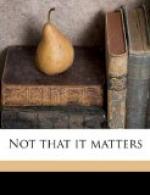Let us begin by asking ourselves what we expect from a profession. In the first place, certainly, we expect a living, but I think we want something more than that. If we were offered a thousand a year to walk from Charing Cross to Barnet every day, reasons of poverty might compel us to accept the offer, but we should hardly be proud of our new profession. We should prefer to earn a thousand a year by doing some more useful work. Indeed, to a man of any fine feeling the profession of Barnet walking would only be tolerable if he could persuade himself that by his exertions he was helping to revive the neglected art of pedestrianism, or to make more popular the neglected beauties of Barnet; if he could hope that, after his three- hundredth journey, inquisitive people would begin to follow him, wondering what he was after, and so come suddenly upon the old Norman church at the cross-roads, or, if they missed this, at any rate upon a much better appetite for their dinner. That is to say, he would have to persuade himself that he was walking, not only for himself, but also for the community.
It seems to me, then, that a profession is a noble or an ignoble one, according as it offers or denies to him who practises it the opportunity of working for some other end than his own advancement. A doctor collects fees from his patients, but he is aiming at something more than pounds, shillings, and pence; he is out to put an end to suffering. A schoolmaster earns a living by teaching, but he does not feel that he is fighting only for himself; he is a crusader on behalf of education. The artist, whatever his medium, is giving a message to the world, expressing the truth as he sees it; for his own profit, perhaps, but not for that alone. All these and a thousand other ways of living have something of nobility in them. We enter them full of high resolves. We tell ourselves that we will follow the light as it has been revealed to us; that our ideals shall never be lowered; that we will refuse to sacrifice our principles to our interests. We fail, of course. The painter finds that “Mother’s Darling” brings in the stuff, and he turns out Mother’s Darlings mechanically. The doctor neglects research and cultivates instead a bedside manner. The schoolmaster drops all his theories of education and conforms hastily to those of his employers. We fail, but it is not because the profession is an ignoble one; we had our chances. Indeed, the light is still there for those who look. It beckons to us.
Now what of the Bar? Is the barrister after anything other than his own advancement? He follows what gleam? What are his ideals? Never mind whether he fails more often or less often than others to attain them; I am not bothering about that. I only want to know what it is that he is after. In the quiet hours when we are alone with ourselves and there is nobody to tell us what fine fellows we are, we come sometimes upon a weak moment in which we wonder, not




